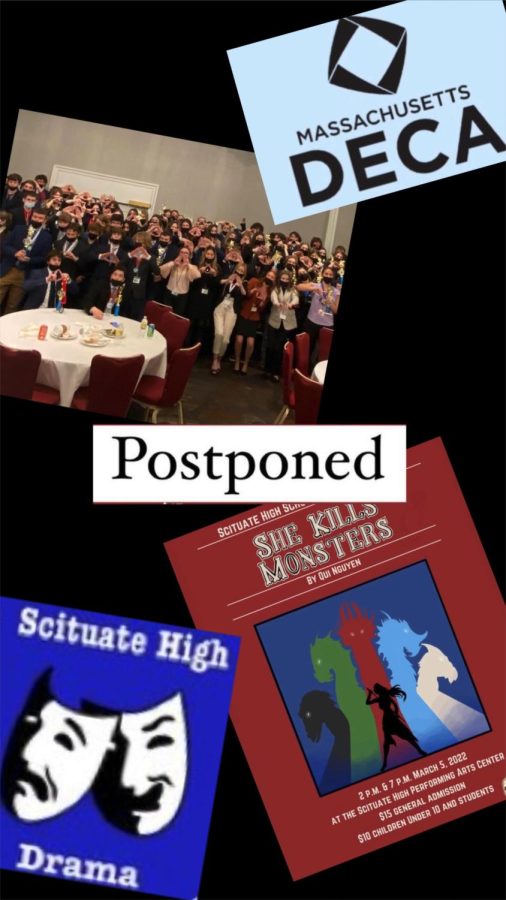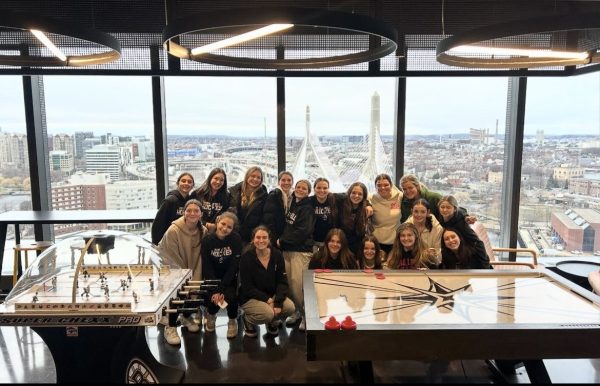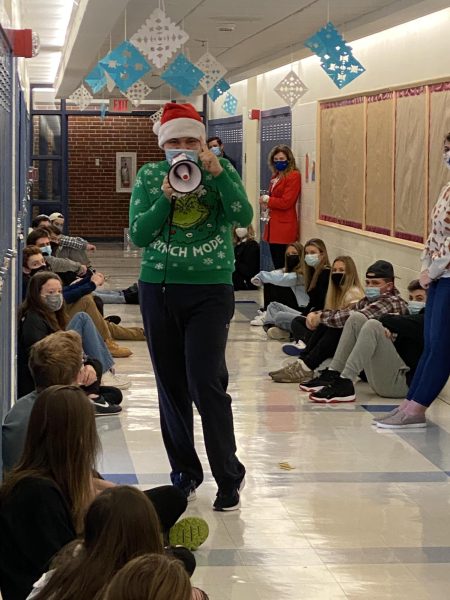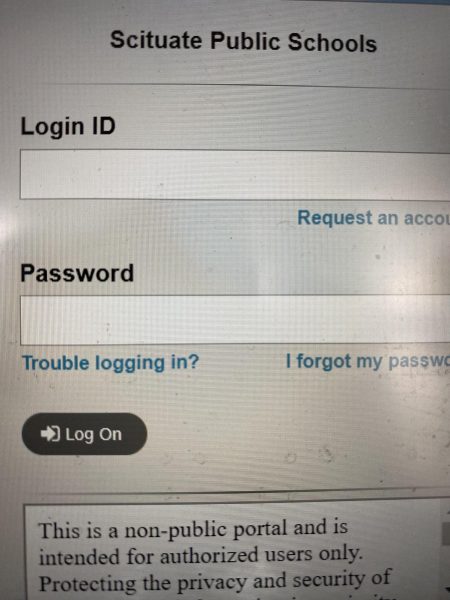SHS School Play “She Kills Monsters” and DECA Postponed Due to COVID-19
February 2, 2022
As COVID cases spiked once again, SHS not only reinforced masking and distancing measures, but the high school community also adapted to the worsening situation by making unfortunate sacrifices. Both DECA and the SHS play “She Kills Monsters,” two events that inspire passion and joy to so many, were postponed. (DECA was postponed to the first week in February, and “She Kills Monsters will be performed on Saturday, March 5th.) The Omicron variant is no joke, and its impacts on schools demonstrate the destructive nature of this pandemic. As the world heads into another period of strong uncertainty, students must once again come together to make it through the academic year.
After so many cancellations last year, numerous school-related clubs and organizations have been looking forward to a year of in-person events. Unfortunately, the school community must once again make sacrifices to adapt–the Drama Club and DECA are two examples.
To gain a little insight into each event, two students involved in the organizations spoke on their experiences. SHS senior, president of the Drama Club, and cast member of “She Kills Monsters,” Francis “Frankie” Minich, describes the show as “a really beautiful story with themes of loss and identity that are really easy to connect with.” SHS junior and younger brother to Frankie, Matthew Minich, spoke as a member of DECA, describing the event as “a series of business competitions where students get real-life situations in which they must problem solve, and then present solutions to a judge.” Matthew added, “It gives us insight into what a career would be like in the real world–something that isn’t really taught in school.”
After a full year of “Zoom School,” students have come to accept that virtual learning simply isn’t the same as in-person: In particular, it doesn’t provide students with a similar level of fulfillment. The same goes for school-related events. Frankie remarked, “Theater is impossible to replicate virtually. The audience is like its own cast member. It’s so hard to act without having an audience to interact with, even if all they’re doing is sitting there and occasionally laughing or clapping.”
Especially in the world of performance and entertainment, seeing the devastation of the effects of COVID-19 has been heartbreaking. Similarly, an in-person DECA experience has been long-awaited. Matthew explained, “I was really looking forward to DECA this year because last year it was completely virtual and had a modified, less productive format. I felt like I didn’t get as much out of it as previous in-person competitions.”
SHS business teacher and DECA faculty advisor, Ross Maki, expresses many of the same sentiments: “Having the event held virtually last year was not an ideal experience for students with regards to what the benefits of competing provide for students.” Maki added, “While I am glad the event last year was not canceled, I felt bad for our students who competed and missed out on the full experience of the competition.”
After asking all three individuals about their favorite part of these experiences, all of their responses necessitated an in-person and live format. Frankie identified his favorite part of a drama performance as the involvement of the audience: “You need the constant audience feedback and enthusiasm to make acting worthwhile. And not to mention it’s nice to be applauded!” Frankie is hopeful that by March 5th, the cast will be able to return to the original, live structure, and the community will be able to witness all of their hard work in person.
In regards to DECA, Matt explained, “I just like the whole concept in general. You get to have a fun time in a hotel with your friends, whilst learning important life skills and showing your abilities in the world of business.” Maki added to this by saying, “I was most looking forward to seeing the students in person at the event. I am always so proud to see our students dressed up in their business attire and doing an outstanding job with building confidence and presenting.”
While these two SHS organizations are different, all of those involved feel the same pain and disappointment from this year’s cancellations and postponements. Despite all the uncertainty, Frankie has taken the right approach, remaining positive and optimistic: “As president of the Drama Club, I am very proud of what the club has been doing despite the uncertainty of doing theater right now. No matter the circumstances, SHS Drama will continue to make art and support its community.”
These times call for uplifting and supportive attitudes, but in order to get through this, the community must also consider the importance of caring for one another by remaining responsible and adhering to the rules put in place. Keep the mask up, social distance, stay home if feeling sick, and get tested if necessary. Maki simplifies this wonderfully by advising the community to “follow the science and take the measures you feel comfortable with.”
The regulations in school and around the community are put in place not only to protect the individual, but to protect the entire Scituate community. All people must do their part by complying to them. The sooner this happens, the sooner the SHS community can find its way back to a regular school routine. The sooner this happens, the sooner the drama community can perform live and DECA can enjoy an in-person experience.
Students and teachers alike can agree on wanting nothing more than returning back to the original, more joyful, more positive school experience. How does one work to achieve this? It’s simple. Be smart, follow the rules, follow the science, stay informed, and look out for others. This way, not only can the SHS Drama Club and DECA return to normalcy, but also the entire school community as a whole.










